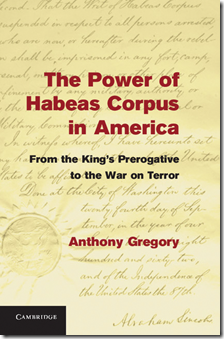 Review of The Power of Habeas Corpus in America: From the King’s Prerogative to the War on Terror by Anthony Gregory. Cambridge University Press and the Independent Institute, 2013.
Review of The Power of Habeas Corpus in America: From the King’s Prerogative to the War on Terror by Anthony Gregory. Cambridge University Press and the Independent Institute, 2013.
Anthony Gregory is a great friend of mine, and I am honored to have the opportunity to review briefly his splendid new book, Habeas Corpus in America.
A few comments about the book itself are in order before sojourning through the content. First, it is a beautiful volume. I suppose we can thank Cambridge University Press for that. The cover itself contains the text of Abraham Lincoln’s order to suspend habeas during the Civil War – a very nice visual touch. The forward is written by the erudite constitutional scholar Kevin Gutzman. The book is written in three parts: history of habeas corpus, application of habeas corpus after 9/11, and a section titled “Custody and Liberty” exploring the future of habeas. Multiple appendices then analyze various habeas cases, and the customary selected bibliography and historical term explanations follow. It is long, thorough, sweeping, and powerful – but also pretty expensive. I suppose we can thank Cambridge University Press for that as well.
Habeas corpus is generally understood as the legal right not to be detained arbitrarily by the government. It is considered a foundational principle of Western legal systems, even of natural law itself. Still, habeas corpus is widely misunderstood, especially on a historical level. Anthony Gregory’s work on the history of habeas corpus and its application in America levels a damning charge against the American federal government and challenges the reader to reconsider the common assumption that the federal government protects liberty by showing how and why they abridge this fundamental right.


 A
A 